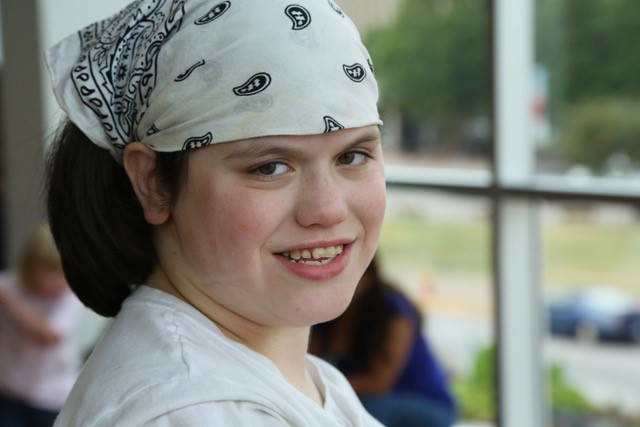New Behavior Guidebook on Strategies to Address Emotional and Behavioral Challenges in SMS
To access this new guidebook publication, please see our Publications and Resources page to download a copy of the new publication.

Challenging behaviors occur at a much higher rate among children and adults with SMS than they do in people with other types of developmental disabilities.
Common behavioral differences in individuals with SMS include:
- Attention-seeking
- Self-injury, including: head banging; hand biting; picking at skin, sores and nails; pulling off finger- and toenails; inserting foreign objects into ears, nose, or other body orifices
- Attention deficits, with or without hyperactivity
- Explosive outbursts
- Prolonged tantrums
- Destructive and aggressive behavior
The reason for these behaviors
appears to be related to underlying physical and developmental differences associated with SMS.
Outbursts often result from frustration over communication difficulties, fine motor deficits, changes in routine or unrealized expectations. Many people with SMS crave interaction with adults and react negatively if attention is withdrawn or directed toward others. People with SMS frequently have rigid ideas about their world; a prolonged tantrum may result if things do not go exactly as expected or envisioned. Some of these behavioral issues may be related to an underlying developmental asynchrony in which emotional growth progresses more slowly than other areas of development. Not surprisingly, sleep disturbance is also known to be a significant contributor to negative behaviors in people with SMS.
A positive perspective is essential when supporting or advocating for your child. It is important to balance the description of challenging behaviors in people with SMS with recognition of their many positive attributes. Many people with SMS have an engaging and endearing personality along with a well-developed sense of humor. Although they crave attention, they are generally appreciative when attention is given and eager to please parents and teachers. Students with SMS are often popular with their peers. Despite the behavioral challenges they can pose, they seem to endear themselves to those around them because of their affectionate natures and happy outbursts of excitability, often accompanied by the SMS “self-hug!”
Behavior Support Strategies
As everyone with SMS is an individual, not all will respond in the same way to the strategies outlined below. We believe that a creative and dedicated support team at home, with a willingness to learn about and support the complex needs of people with SMS, is the best predictor of success.
Behavior in individuals with SMS is influenced more by antecedents and settings than by consequences.
Even highly-motivating positive reinforcers or reward systems may not be enough to prevent an outburst if certain “triggers” are pushed. Identification and avoidance of known triggers are more effective for individuals with SMS than consequence-based behavioral approaches.
Behaviors that receive a neutral responses or are redirected may or may not decrease. However, behaviors that receive a highly charged emotional response will almost certainly increase in frequency and duration. When interacting with an individual with SMS make every attempt to limit the attention given to negative behavior while providing consistent positive support for appropriate behavior.
Redirection, distraction and avoidance of triggers are by far more successful than trying to stop an outburst already in progress.
Pay careful attention to initial physical and verbal cues that an individual with SMS is becoming agitated. Caregivers should make every attempt to identify these early indications and develop strategies to redirect and distract at the first signs of escalation toward an outburst.
Use humor to distract, disengage, or redirect an individual with SMS when he/she is beginning to show signs of frustration or agitation.
Individuals with SMS often have a good sense of humor and enjoy jokes and gentle teasing. Funny expressions convey concepts in an upbeat way while prompting appropriate behaviors.
For more Behavior Support Strategies purchase a copy of PRISMS On the Road to Success with SMS: A Smith-Magenis Guidebook for Schools.
Establish an SMS-friendly Environment
- Caregivers should make effort to not be too rigid – flexibility is key
- Plan expectations and rules around the individual’s developmental and emotional age
- Always consider the individual’s language level and capacity to communicate
- Remember sleep, specifically lack of sleep, is always a factor and should be considered when setting daily expectations
Supportive and Consistent Caregivers Are Key
- Understand that SMS reactionary behaviors are challenging for the individual to control
- Appear as calm as possible in situations. Individuals with SMS often need to “borrow”
- Make every effort to not allow your own behavior and reactions to escalate a situation
There is more detailed information about behavior in the following resources. We welcome you to download or print the below resources for your personal reference and use, but the resources may not be posted to other websites or other areas of social media.


